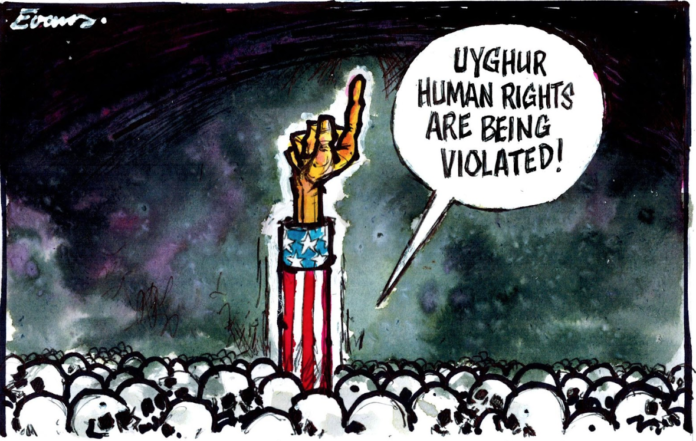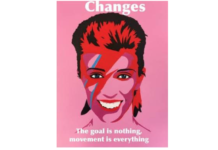Tensions between the United States (along with its allies including neighbouring Australia) and China are widening to an alarming concern despite being temporarily side-lined by the more public scrap between the United States (and NATO) and Russia over Ukraine.
The conflict language with China is starting to escalate to a militarist tone but is couched in a contrived narrative of China’s alleged military build-up in the Pacific, Taiwan, and human rights in Hong Kong and Xinjiang. It has the feel of setting the scene for an undeclared war.
However, this narrative does not include the United States own large military presence in the Pacific (including a nuclear arsenal on the Korean peninsula), and human rights both in respect of its own population and those in authoritarian countries that it militarily supports such as Columbia.
The United States accuses China of disrespecting what it labels a ‘rules-based’ international system. But this is not an international system. It is an American system that it expects its allies, friends and the rest of the world (where it thinks it can get away with it) to follow.

Nanaia Mahuta, New Zealand Foreign Affairs Minister, in an awkward position
New Zealand is placed in an awkward position in this widening escalation. Officially the country is not an ally but a ‘friend’ of the United States. But the military and economic ties are close. On the other hand, China is its biggest trading partner.
Foreign minister Nanaia Mahuta has handled this awkwardness with some adroitness but the pressure from the United States and its networks such as Five Eyes is considerable.
The Taiwan complication
Taiwan is an interesting complication. China regards Taiwan as its own and there is a historical argument to support this. But Taiwan continues to officially call itself the Republic of China (ROC). The history of the ROC was that it was founded in 1912 in China. However, Taiwan was then under Japanese colonial rule (previously it was part of China).
In 1949, following the Chinese Revolution led by the Communist Party and the formation of the Peoples Republic of China, the defeated ROC government relocated to Taiwan (Japan had lost control after its defeat in World War 11). But the ROC continued to maintain a claim to be the government of all China including the mainland.
The claim for Taiwanese self-determination would be stronger if it were to drop the absurdity of calling itself the Republic of China. This would remove overblown pretentiousness and enhance legitimacy.
What’s really behind this narrative
But is this escalation really about human rights and China’s military. It began under President Obama, escalated under President Trump and is further escalating under President Biden. Some readers will find it almost sacrilegious to say this but Trump was the most honest of the three presidents on this matter.
Trump called a spade a spade; it was all about trade and so he launched a trade war against China. The pretence of human rights generated no interest.

Donald Trump: it’s all about trade
In search of further insight I came across an absorbing article published last July in the American socialist magazine Monthly Review. is China imperialist or semi-periphery?
Written by Minqi Li, Professor of Economics at the University of Utah, it focusses on whether China is an imperialist country or not. His article has a much wider scope than my specific interest but I recommend it as a very good read in its own right.
Surplus value and China’s economy
Minqi Li’s perspective begins with his observation of China’s economy describing it as the world’s largest when measured by purchasing power parity. Its rapid expansion is reshapes the global geopolitical map leading western mainstream media to begin defining China as a new imperialist power.
Understanding surplus value is important for his analysis. Broadly speaking it is the excess of socialised value produced by workers’ labour over the remuneration paid. He adapts this to a country context in the international capitalist system.

Surplus value
Minqi Li acknowledges that China has developed an exploitative relationship with South Asia, Africa, and other raw material exporters.
But, in his assessment as an economist, overall China continues to transfer a greater amount of surplus value to the core countries in the capitalist world system than it receives from the periphery.
World-systems theory
Turning to world-systems theory to explain, Minqi Li divides countries into three types: core, semi-periphery, and periphery. The ‘core countries’ specialise in quasi-monopolistic, high-profit production processes. This leaves ‘peripheral countries’ to specialise in highly competitive, low-profit production processes.
The relationship between ‘core’ and ‘peripheral countries’ is illustrated by surplus value. That is, surplus value is transferred from the peripheral producers to the core producers, resulting in unequal exchange and concentration of world wealth in the core.
Where does this leave semi-peripheral countries. According to Minqi Li, they have “a relatively even mix” of core-like and periphery-like production processes. They take surplus value from some parts of the world and give it to others.
This is where he places China – predominately taking surplus value from developed economies and giving it to developing economies.
The ‘core’ of the ‘war’ against China
If China were to become a core country in the capitalist world system, the existing core countries would have to give up most of the surplus value they are currently extracting from the periphery.

Great wall between China and ‘core countries‘
It is inconceivable that the core countries would remain economically and politically stable under such a development unless they could develop new schemes of exploitation at such a massive level to seriously risk either rebellion or collapse.
Where does this leave the ‘core countries’, predominately in North America and Europe? They don’t want to wind back capitalism in China. They want to constrain it to ensure that while it continues to be an attractive market for them, China does not destablise them by progressing to a ‘core country’.
Ian Powell was Executive Director of the Association of Salaried Medical Specialists, the professional union representing senior doctors and dentists in New Zealand, for over 30 years, until December 2019. He is now a health systems, labour market, and political commentator living in the small river estuary community of Otaihanga (the place by the tide). First published at Political Bytes





Appreciate the link. Most interesting.
It is a must read in regards explaining Core and Peripheral countries.
It is a pity we don’t have a New Zealand Reserve Bank that can do such in-depth discussion raising research for our local endeavours.
Specially in regards the environment and oil usage. Last paragraph sums up the dilemma. If China becomes a core country, the environment (and earth) will change dramatically. Can humans survive China becoming a core country (as their leaders goals are currently)?
“Finally, there is the unlikely scenario that China somehow “succeeds” in its national project to “catch up” with the West and joins the core of the capitalist world system. In this scenario, the combined energy demand by China and the existing core countries, as well as the enormous greenhouse gas emissions and other pollutants generated by a greatly expanded imperialist core, will completely overwhelm the global ecological system, destroying not only the environment but also any meaningful hope for a sustainable human civilization. It is therefore in the best interest of humanity as well as China that such a scenario does not materialize.”
So what will the New Zealand Greens do?
@Gerrit
That’s easy, they will focus on virtue signalling and middle class welfare, whilst persuing a legislative program criminalizing males and free speech … because you know environment??
yup that’s about the size of it…
Again, another so-called “balanced” article on China, and Human Rights, but fails to explain China’s reeducation centres for its Muslim subjects, China’s infamous Black Prisons (unlisted, classified prisons for its subjects), or its BS towards the WHO investigate of the Wuhan Covid Lab…refusing access to the WHO investigators, for a month until the lab was cleaned, and clear
The article had a brief mention about human rights in China followed by this “However, this narrative does not include the United States own large military presence in the Pacific (including a nuclear arsenal on the Korean peninsula), and human rights both in respect of its own population and those in authoritarian countries that it militarily supports such as Columbia.”
Unfortunately, all governments have skeletons in the closet although the various supporters tend to be selective about which problems they see.
Unfortunately, all governments have skeletons in the closet although the various supporters tend to be selective about which problems they see.
The above is quite correct I was just reading somewhere about prisoners in the US making McDonalds uniforms which the prisons have contracts for. Exploitative slave labour.
And then there is the continuing appalling situation in Guantanamo Bay. Which frankly the world seems to have conveniently forgotten about.
The purpose of the blog was not to discuss China’s human rights record or that of the United States. The purpose was to argue that this was not the driver of the widening conflict and risk of ‘war’ between the two countries.
Agree that the rhetoric on China is driven by economics and power politics rather than a concern for human rights however your seeming dismissal of Taiwan and soft pedaling on China is ridiculous.
“The claim for Taiwanese self-determination would be stronger if it were to drop the absurdity of calling itself the Republic of China. This would remove overblown pretentiousness and enhance legitimacy.’”
If verbal jousting was a key means of determining legitimacy, one could equally point to the ‘overblown pretentiousness’ of China’s ‘wolf-warrior’ diplomats throwing hissy-fits when someone calls Taiwan a ‘country’.
To expand slightly on your history lesson it’s worth noting that Chiang Kai-Shek’s ROC forces were responsible for roughly 99% of the fighting against the Japanese. The resulting exhaustion may have been decisive in their later defeat by Mao’s forces. However Mao did not take Taiwan and Taiwan calling itself ROC is no more absurd (arguably far less) than the PROC’s claim of Taiwan as a province.
ok nate, here’s your starter for 10, no conferring..
Which country PER CAPITA has most of it’s citizens banged up? more than adolf, more than stalin, hell even more than jacinda…and predominantly those banged up are ‘minority’ and only guilty of the crime of poverty.
G’wan take a swing nate…and then write to our foreign minister and ask why no condemnation of the ‘fascist commie hellhole’ in question.
is the answer the U.S.A?
it would indeed glasshopper, the force is strong in you.
What about the world’s largest open air prison Tibet, or the whole of Hong Kong, which are prisoners to the CCP…per capita prisoners level beyond the USA
hyperbole isn’t a winning strategy nathan, contend my facts..
China, hands down…we (the Daily Blog community) are not allowed to write about China’s downside in China…people have, then disappear
see ya the nathan…
oh no your still here thus proving the groundlessness of your rhetoric
CCP China has no claim to Taiwan other than historical colonization. Defeated Ming forces occupied Taiwan. later after giving up fight against Qing Koxinga made himself an independent King/Kingdom later after his death his heirs submitted to Qing, later Qing overthrown by KMT, later KMT defeated in Taiwan by Japanese, then Japanese defeated/surrendered in Taiwan by KMT. CCP never governed Taiwan so has no legitimate claim. KMT governed Taiwan so has more legitimacy but still just colonialist imperialist occupier. Spanish Colonisers, Dutch Colonisers, Ming & Qing royalists have just as much claim as CCP LOL
To avoid ambiguity (hopefully) I said that China had a claim, not the claim, to Taiwan. Personally I believe it comes down to a question of the right to self-determination but it can’t be realised while Taiwan continues to call itself the Republic of China.
I think Minqi Li is right that China has yet to catch up with the US. But it is definitely on that trajectory. He fails to note just how exceptional China’s growth has been since 2000. Not only did it maintain its independence from imperialism after it restored capitalism in the 1990s, allowing FDI in on strict terms including transfer if IP, it has come from behind and is still overtaking the declining Western imperialist powers.
Of course its US bonds allows the US to pump value out of China for nothing. But the US does this to all other countries and its hegemony rests on the dollar. The important point is that bailing out US is a strength for China, and a weakness for the US reflecting their respective trajectories.
This is an important point. The rivalry between imperialist powers is a zero-sum game. Any China gain is a US loss. So the increased flow of value and resources going to China is not peculiar to China. The earth has already passed its capacity to sustain capitalism. Imperialist rivalry means that we will now face more pressure for war as they fight over what is left of resources.
War is always at the expense of the producers of value, the working class, creating the conditions for revolution. At this point the determining factor will be the response of nature, led by the global working class representing humanity, as part of nature, putting an end to the capitalocene and restoring the balance between humanity and nature.
Agree re the zero sum game of imperial powers and where that likely leads, but I’m not convinced the upward trajectory of China is a given. The reforms Deng Xiaoping put in place allowing China’s rise are being reversed under Xi to preserve CCP hegemony (and relevance). In addition there is a raft of directives that have a cultural revolution flavour turning back the clock on social liberalism and further towards a Han ethno-nationalist state. Economically there are rolling blackouts and a debt ponzi scheme in the construction industry (about 25% of GDP) that is in the process of collapsing, not to mention the roads to nowhere, ghost cities and notoriously poor quality control that has been created as a result.
Beyond that the “increased flow of value and resources going to China” can easily be cut by the US and it’s allies, arguably the most significant part of the AUKUS deal is not submarines but the missile systems that can disrupt shipping to/from China while staying clear of China’s own navy that can only project power regionally within air cover of the mainland. In the open water the Chinese Navy, while outnumbering the US in vessels, is far behind in tonnage, range and capability.
Yes China’s growth will inevitably lead to war with US as China must grow to survive, and the US must stop it to survive. There is no point debating the ins and outs of this except to challenge war as the necessary outcome.
Those who always pay the price of war, the mass majority who produce the wealth, have the power to strike to halt the global economy and refuse to fight in any of these wars.
What stands between them and the tiny ruling class are the layers of bureaucrats, mercenaries and spies who don’t have the capacity to defeat a mobilised and armed mass movement.
That mass movement to survive will be the power base for a new society which reverses the rush to extinction and returns us to harmony with nature.
China vs US who is winning?
https://www.youtube.com/watch?v=SsBIKUkHP0o
China, hands down…we (the Daily Blog community) are not allowed to write about China’s downside in China…people have, then disappear
tui your 1st para sounds like a description of the US with a few tweaks here and there.
Yes, some tweaks and instead of Han ethno-nationlist state, substitute Corporatocracy of the billionaire class.
yup tui and china ain’t communist not even close,
if a red flag makes you communist LFC(liverpool football club) is the last bastion of stalinism.
Yes in the same way we don’t have capitalism that Adam Smith would approve of. However while not communist China is a near inevitable result of applied communism.
IMO small communes can work but at the national level unless your state and local leadership ranks high on the virtue-o-meter and can keep the sociopaths from holding office for all time, applied communism is just as corruptible as laissez faire capitalism. Both lead to unchecked monopolies of power and cronyism. Money and status games.